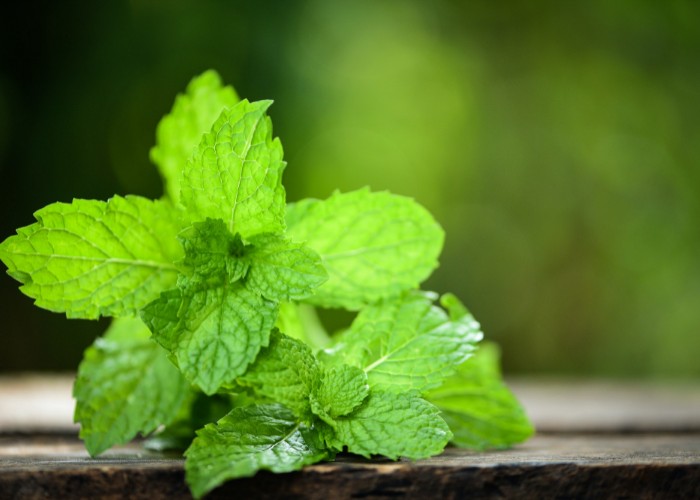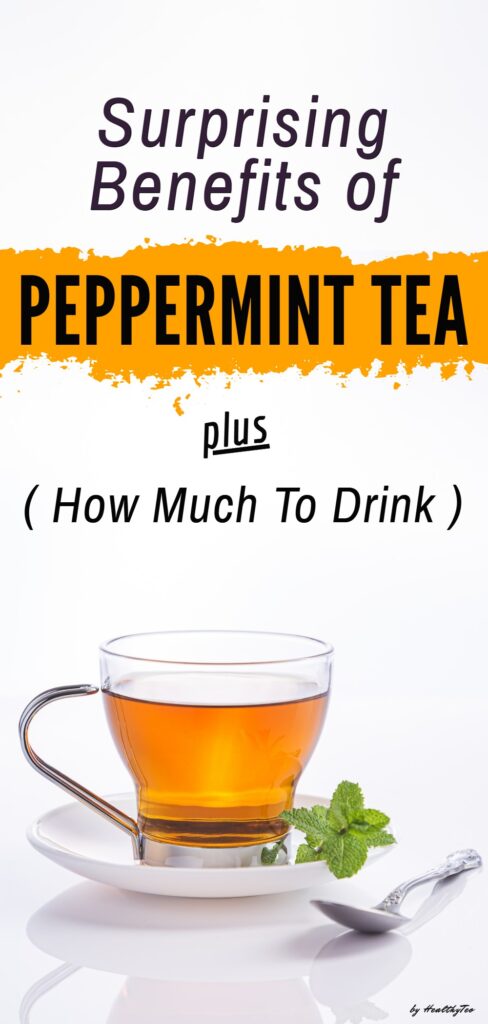Find out what are the benefits of peppermint tea and how often you should drink it!
Peppermint tea is a caffeine-free herbal tea made from the peppermint plant native to Asia and Europe. Peppermint (Mentha x Piperita) is a hybrid mint, a cross between watermint and spearmint.
This plant has been used for thousands of years for its pleasant, minty taste and health benefits. Peppermint today is used as a flavoring in candies, breath mints, toothpaste, etc.
Peppermint leaves contain several essential oils: menthol, menthone, and limonene. Menthol is responsible for cooling properties and recognizable minty scents.
Peppermint tea is made by steeping the dried or fresh leaves and it is often drunk for its flavor. This tea is not just refreshing and delicious but it also provides many health benefits that we will present here.
Also, you can read what are the potential dangers of drinking too much peppermint tea and how to make it at home from fresh or dried leaves.
Before we start with the benefits of peppermint tea here are some interesting facts for peppermint:
- Peppermint is the number 1 selling flavor among non-chocolate, hard candies
- Ancient Greeks believed mint could cure hiccups
- Peppermint can be found growing wild in moist areas throughout Europe and North America
- The U.S. produces 70% of the Worlds peppermint supply
- Peppermint is the most extensively used volatile oil, both commercially and medicinally
This post may contain affiliate links, which means we may receive a small commission, at no cost to you, if you make a purchase through a link. For more information, please see our disclosure.

What are the benefits of peppermint tea?
Soothes the upset stomach and improves digestion
Peppermint has long been used as a remedy for digestive issues such as bloating, gas, and upset stomach. The cooling effects of menthol in peppermint tea help to soothe an upset stomach.
First, menthol stimulates the secretion of gastric juices that can break down food and speed up digestion. Also, menthol relaxes the stomach muscles that can contract and cause cramping. The cooling effect of menthol improves circulation and relieves inflammation that causes stomach pain.
In addition to soothing an upset stomach, peppermint tea can help regulate digestion to keep everything running smoothly. A study from 2002 conducted at the University of Exeter showed that peppermint tea moves gas throughout the body thus relieving the feeling of bloating and cramps.
The presence of menthol in peppermint is beneficial for other things when it comes to digestive issues. It increases bile in the stomach, which helps to digest foods more efficiently.
This reduces the symptoms of constipation and diarrhea and helps to keep your system working optimally. Menthol relaxes the muscles in the digestive tract which is the reason why peppermint tea is good for people with irritable bowel syndrome.
May freshen your breath
Further, peppermint tea is good for you because it’s a true hero when it comes to fresh breath. There’s a good reason why peppermint is a common flavoring to mouthwashes, toothpaste, and chewing gums.
Not only does that have a pleasant smell, but peppermint also has antibacterial properties that help kill germs that cause dental plaque, which may improve your breath.
To reap the fresh breath benefits of peppermint tea, it’s recommended to drink one cup first thing in the morning.
You can also drink peppermint tea after consuming smelly foods such as onions or garlic to neutralize the odors. Or just simply drink a cup of peppermint tea when bad breath arises.
It helps out with mental clarity
Peppermint has been found to aid in performance for complex tasks and help ease mental fatigue. Studies have shown the scent of menthol stimulates the hippocampus area that controls mental clarity and focus.
So, when drinking peppermint tea the result is increased feelings of rejuvenation and a refreshed focus.
To get the best result brew a hot cup of peppermint tea and sip slowly. Inhale the aromas and savor the taste as your mental acuity sharpens.
Relaxation and stress relief
Peppermint tea is a naturally caffeine-free drink. You can consume it at any time of the day. The lack of caffeine means that you can drink it without worrying about insomnia and also means you won’t feel jittery. Further, peppermint’s capacity as a muscle relaxant may help you relax before bed.
Find out more about caffeine-free teas that can replace your morning coffee here: Best Tea Alternatives To Your Morning Coffee With and Without Caffeine
This herbal tea is common in aromatherapy as a way to increase overall wellbeing and reduce stress. This comes as a result of peppermint’s natural sedative qualities that help you relax after a long day.
Drinking hot peppermint tea can help to lower your overall body temperature, allowing your body to relax and alleviating any inflammation. Anti-inflammatory properties also reduce blood pressure, inducing a calm state.
May relieve clogged sinuses
Peppermint has anti-inflammatory, antibacterial, and antiviral properties. As a result of this peppermint tea may fight clogged sinuses due to infections, the common colds, and allergies.
Menthol, one of the active compounds in peppermint improves the perception of airflow in our nasal cavity. Therefore, steam from peppermint tea may help you feel as though your breathing is easier.
Helps prevent nausea
Antispasmodic properties of peppermint tea can treat the feelings of nausea and prevent vomiting. Peppermint scent can inhibit feelings of nausea while organic compounds in the mint help to soothe stomach muscles that contract and lead to vomiting.
It helps relieve headaches
While no evidence exists that peppermint tea improves headache symptoms there are some studies about peppermint oil. In a randomized controlled trial in 35 people with migraine, peppermint oil applied to the temples and forehead drastically reduced pain after two hours, compared to a placebo oil.
Menthol has a cooling sensation that may help ease tension or migraine headache pain when a person applies peppermint oil to the forehead or temples.
It is possible that the aroma from peppermint tea may have a similar effect, but there is no supporting scientific evidence to confirm this effect.
Is peppermint tea safe during pregnancy?
You can drink peppermint tea while pregnant, and to date, very few adverse effects have been recorded when consumed in typical amounts of 1 to 2 cups per day.
It’s considered a better choice over non-herbal teas such as oolong, black, and green tea that contain caffeine. Even peppermint tea is a caffeine-free drink you should still avoid drinking large amounts.
According to a review from 2017 that looked at the use of herbal medicine in pregnant women in Asian countries, oral consumption of peppermint in pregnancy is considered generally safe in lower doses.
Summing-Up: While you are pregnant you can drink peppermint tea but it’s probably wise not to drink more than 1 to 2 cups per day.
As with many herbal concoctions, if you drink too much in large quantities you may experience unwanted side effects like stomach upset. It’s also good to inform your healthcare provider of any herbs that you are ingesting, even if they are generally considered safe during pregnancy.
Potential risks and considerations of drinking peppermint tea
Peppermint tea is generally very safe for people of all ages to consume. However, this tea should be avoided by people with allergies to peppermint and those who suffer from acid reflux.
Drinking peppermint tea can trigger or worsen symptoms of heartburn and GERD. If you suffer from acid reflux you should not consume peppermint tea. This is because peppermint tea can relax the muscles in the esophagus that prevent stomach acid bile flow into the esophagus.
By drinking this tea you can actually increase your symptoms of heartburn and indigestion.
People who are allergic to peppermint or any other chemicals in peppermint should not drink this tea. Also, this tea might interact with your diabetic medications.
So, individuals who are diabetic should avoid this tea or take it after consulting their doctor.
How to make peppermint tea from fresh leaves
It’s so easy and simple to make a delicious peppermint tea at home. You can make this tea using peppermint tea bags, dried loose leaves, or fresh peppermint leaves.

To make your own peppermint tea:
Prepare leaves: For loose leaf teas use a tea infuser to keep the leaves contained. If you are using fresh peppermint leaves make sure to rub them a bit in your hands to get the oils flowing first or grind a bit to release the flavors.
Boil water: Peppermint tea is best consumed using hot water instead of boiling water. After bringing the water to a boil, let it cool for a minute or two before pouring it into your cup.
Steep: Steeping time is usually 5 to 10 minutes depending on your leaves. If you use fresh peppermint leaves you should steep for a few extra minutes and it’s best to keep your container or mug covered. The longer you steep the leaves the more the flavor will develop.
Strain leaves: After straining the leaves you can drink the tea as it is or you can serve it with a drizzle of honey and a squeeze of lemon.
How much to drink
Peppermint tea is a naturally caffeine-free drink and you can drink it throughout the day. It contains zero calories which makes it a great alternative to fruit juices, soda, and other sugary drinks. If you flavor the tea with honey, sugar or other sweeteners will add calories to the drink.
There is not an established amount of peppermint tea that is recommended for daily consumption, however, drinking 1-2 cups daily is enough to reap the benefits of this delicious herbal tea.
The best time to drink it is after a meal to aid digestion, in the afternoon to boost your energy, or before bed to help you relax.
Peppermint tea FAQ
Is peppermint tea caffeine-free?
Peppermint tea is a caffeine-free beverage, the only way any tea can have caffeine is if it’s made using the plant ” Camellia Sinensis“. Peppermint tea is made by using the peppermint plant, which has zero caffeine, so peppermint tea is caffeine-free.
Does peppermint tea help you sleep?
Peppermint tea as a naturally caffeine-free drink is a great choice before bed and it may improve your sleep. What’s more peppermint’s capacity as a muscle relaxant may help you relax before bedtime.
Do you put milk in peppermint tea?
Absolutely not! When brewed without any accompaniments, this beverage boasts extraordinary minty, menthol flavors. By adding milk you are diminishing its taste significantly.
When to drink peppermint tea?
It doesn’t matter when you drink this herbal tea. Whether you like to ‘brew up’ first thing in the morning or last thing at night, you won’t make a mistake. Overconsumption is not a good thing and may cause some side effects, drink 1-2 cups per day.

Final thoughts about peppermint tea and why it is good for you
Peppermint tea is a naturally sweet, calorie, and caffeine-free beverage. By drinking just 1 to 2 cups per day you can reap all the benefits from this herbal tea.
A refreshing aroma and cool taste are a great choice for bad breath, better digestion, and reduced pain from headaches. It also has antibacterial properties.
Generally safe to drink for most people, although some people with GERD find that drinking peppermint tea can trigger or worsen the symptoms.
Every cup of peppermint tea gives you a range of vitamins, minerals, and antioxidants. The great thing about this tea is that you can consume it at any time of the day. So, make your cup of peppermint tea and enjoy!




